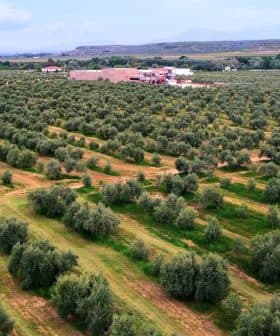Farm Bill Notes Call on Agencies to 'Remove Obstacles' to Olive Oil Trade
The Joint Explanatory Statement accompanying the Agricultural Act of 2014 highlights issues in the olive oil industry, including disputes over testing standards, tariffs impeding exports, and potential consumer confusion. The Statement calls on government agencies to address these concerns and work with the industry to develop effective enforcement of global standards.
Similar to a cheat sheet, or CliffsNotes, the Joint Explanatory Statement of the Committee of Conference offers a walk-through of the behind-the-bill positions underlying the iterations of the Farm Bill. Although the Agricultural Act of 2014 signed by President Obama last week makes no reference to olive oil, the Act’s accompanying explanatory statement calls for action on the olive oil front.
We’re thrilled about the strong statement and the spotlight on the industry
A Joint Explanatory Statement is considered highly reliable legislative history when interpreting a statute.
In the 186-page congressional document attached to the bill, several pages were devoted to the olive oil industry.
The Statement indicates that disputes over testing standards and methods result in an unenforceable morass of product quality that is confusing to consumers, and blames tariffs for impeding U.S. exports of olive oil to other countries.
The report calls upon the U.S. Department of Agriculture, Trade Representative and the U.S. Food and Drug Administration to review the U.S. International Trade Commission report on olive oil competiveness completed last year and “remove the obstacles that are preventing the U.S. olive oil industry from reaching its potential.” In addition, the Statement urges the USDA to assess whether a marketing order for olive oil would be a viable solution to protect consumers, domestic growers and importers.
Although the Joint Explanatory Statement is not part of the bill language, it “has quite a bit of weight,” said Kimberly Houlding, executive director of the American Olive Oil Producers Association (AOOPA). “We’re thrilled about the strong statement and the spotlight on the industry.”
The AOOPA supports adopting testing and labeling standards, making international subsidies transparent and eliminating tariffs that prevent U.S. producer competitiveness in foreign markets. “Consumers deserve the ability to choose from the greatest variety of products possible and to be sure they are getting the quality product for which they are paying,” said Houlding.
The North American Olive Oil Association also supports the Statement’s call for testing and labeling standards. Executive vice president Eryn Balch said, “One federal standard of identity for olive oil would be beneficial to the U.S. market,” and indicated that the association plans to work with the agencies and the olive oil industry to develop “effective enforcement of global standards.”
Excerpt from the Joint Explanatory Statement concerning olive oil:

In addition to the challenges associated with the production of an agriculture commodity, olive growers and olive oil processors face additional concerns related to trade and product standards of identity. With reference to international trade, tariff disparities pose a significant barrier to our export potential.
Regarding standards, the International Olive Council, an intergovernmental organization under the auspices of the United Nations, has traditionally set standards for olive oil throughout the world. USDA standards for olive oil closely match those of the IOC, even though the United States is not an IOC member.
However, testing standards continue to be an area of dispute due to differences in naturally occurring compounds, rapid chemical decomposition in olive oil, challenges related to sensory testing, and disagreement over what constitutes adulteration. Because of the difficulty in establishing an enforceable national standard of identity, there is potential for consumer confusion in cases where blending of oils and lesser quality oils into extra virgin olive oil is alleged to have occurred. In fact, Connecticut, New York, and Oregon have recently enacted olive oil grade standards to address consumer concerns.
A recent U.S. International Trade Commission report, “Olive Oil: Conditions of Competition between U.S. and Major Foreign Supplier Industries (Investigation No. 332 – 537),” issued September 12, 2013, at the behest of the U.S. House of Representatives Committee on Ways and Means documents some of these concerns.
The Commission’s staff interviewed U.S. olive oil importers, European olive oil producers and exporters, U.S. olive growers and processors, government officials and others involved in the world olive oil industry. In the U.S. the total value of domestic and imported olive oil exceeds $1 billion and at the retail level the value is in excess of $5 billion. The report provided evidence of different olive oil standards in the U.S. and in foreign markets, which adds to the confusion.
Highlights from the report point indicate that:
— 1096 Current international standards for extra virgin olive oil allow a wide range of oil qualities to be marketed as extra virgin. In addition, the standards are widely unenforced. Mandatory testing with penalties for noncompliance exists only in Canada and the European Union. However, testing in the EU is only mandatory for a very small share of production (0.1 percent). Broad and unforced standards lead to adulterated and mislabeled products, weakening the competitiveness of high-quality producers, such as those in the United States, who try to differentiate their product based on quality.
— Olive oil consumption has risen due to a recent focus on the benefits of a healthy diet, and as a result, the olive oil industry has great potential for our nation’s farmers. However, barriers remain for domestic production. Many consumers also make purchasing decisions based on price. The Managers acknowledge that additional testing procedures could have an effect on olive oil importers and consumers.
The Managers urge the U.S. Department of Agriculture, U.S. Trade Representative and the U.S. Food and Drug Administration to study the U.S. International Trade Commission report and take action to remove the obstacles that are preventing the U.S. olive oil industry from reaching its potential. The Managers encourage USDA to collaborate with industry officials to determine if a marketing order for olive oil would effectively address concerns, benefit the U.S. consumer, and protect domestic growers and importers.








